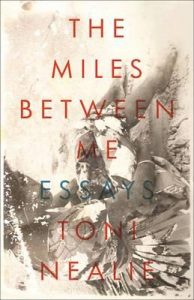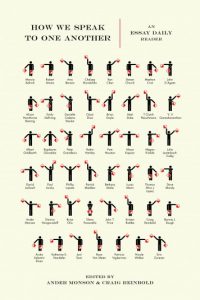
The Miles Between Me
Toni Nealie
Curbside Splendor
200 pages, paper, from $9.95
Beginning with the writer’s relocation to the United States from New Zealand two weeks prior to September 11, 2001, The Miles Between Me counts among its recurrent concerns colonial legacies of racism and white supremacy, the violence of borders, and the losses inherent in distance. And while the title suggests a potential fragmentation or rupturing of the self, the book’s opening sentence—“I like to fly”—insists also on a pleasure in movement, a straightforward joy in the moments when we both have been and will be somewhere.
The Miles Between Me is Nealie’s first book, a collection of essays with scopes at time lyric, personal, and critical. They are, like many of the best works in the genre, vehicles in which the writer’s own intimate questions are allowed to travel through and be formed by the circumstances that surround her life. In “The Dark-Skinned Dispenser of Remedies,” for instance, Nealie researches the life of her grandfather, a medical herbalist and immigrant to New Zealand from India who was sentenced to hard labor in prison when a girl died after passing through his care, the manslaughter charge clearly motivated by racism rather than wrongdoing. While the history itself and Nealie’s deft narrative engage, it is the ultimate questions of family and history, of what we inherit, that truly elevate the essay. Reconciling her mother’s memory of her grandfather as a cruel man with the cruelties he also faced, Nealie pushes always for greater complexities and, in turn, greater empathies for mother and grandfather both.
Divided into three sections, “Unraveling,” “Bequeathed,” and “The Miles Between Me,” the concerns of this collection are recurrent, meandering in that way essays are particularly adept at meandering. In discussing distance, Nealie notes that “To connect seems impossible and marvelous.” In facing what she has inherited: “Now I decide what to hold on to, what to let go of, and what to pass on.” In thinking through the sadism of the border patrol: “My love affair is with my husband, not my adopted country, or the gatekeepers.” Neither wholly distinct nor entirely dependent on one another, these concerns echo. All borders are somewhat porous, and all people make their choices in the imperfect contexts of place.
To try to face any one topic as singular would be to face it incompletely. Instead, Nealie writes through the lens of the generous self, able to pay attention, beautifully, and to draw the connections only the self can draw. “Lesser, today, is the distance to home, which I recognize as the space fashioned inside of me,” she writes. Thought has a movement to it, and movement a thought. Careful, evocative, and surprising, The Miles Between Me offers us a chance to move along with it.
—T Clutch Fleischmann






